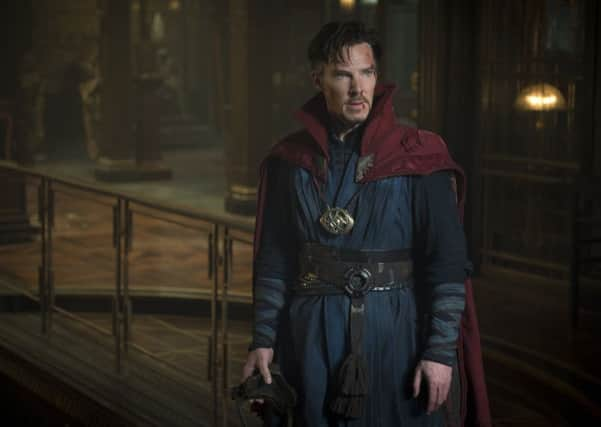Film reviews: Doctor Strange | Lo and Behold | Ethel & Ernest | Starfish | Train to Busan


Doctor Strange (12A) ****
Lo and Behold, Reveries of the Connected World (12A) ***
Ethel & Ernest (PG) ****
Starfish (15) ***
Train to Busan (15) ****
The Marvel Cinematic Universe expands into a multiverse with Doctor Strange, the first cinematic outing for the hitherto obscure counterculture-influenced superhero who can summon magic from different dimensions and bend the laws of nature. Delivering a sort of tongue-in-cheek New Age spin on The Matrix and Inception, co-writer/director Scott Derrickson has found a nifty way through all the spiritual hokum of the comics to deliver a film that’s a little more wigged out than the Marvel brand usually allows these days. Of course it helps that it’s funny, particularly Benedict Cumberbatch in the lead. As the arrogant and egotistical neurosurgeon Doctor Stephen Strange, he may have a touch of Robert Downey Jr’s Tony Stark about him, but the film soon transcends the influence of the first Iron Man movie as the character’s world collapses around him following a car crash that shatters the bones in his hands and robs him of his calling in life. Seeking out a cure in Nepal, Strange comes across a cabal of sorcerers led by a bald-headed Tilda Swinton, who goes by the name of The Ancient One and proceeds to blow Strange’s mind by introducing him to the concept of astral projection by pinballing his soul across various universes.
As set-up scenes go, it’s pretty trippy, but it does a good job of introducing the cinematic parameters of a world in which there are no real parameters. The film also has a healthy sense of it’s own ridiculousness and its scientist hero’s initial skepticism makes for a funny origins story – one replete with pop culture gags about Beyoncé, a prog rock soundtrack in tribute to its 1960s comic book origins, and Chiwetel Ejiofor (channeling his role in Serenity) as a spiritual warrior in possession of magic hover boots. If there’s a downside it’s the short shrift Rachel McAdams gets as the Doctor Strange love interest (Marvel still can’t seem to have more than one female character of significance per movie). Mostly, though, this is a weird and witty breath of fresh air– and as a bonus it also finds a neat solution to the excessive third-act destruction of The Avengers/Captain America films without stinting on spectacle.
Advertisement
Hide AdWerner Herzog’s Lo and Behold, Reveries of the Connected World finds the intrepid Bavarian filmmaker delving into the wonders and oddities of the World Wide Web. That’s a rich subject for someone with Herzog’s questing brain, and this exploration of the birth and development of the internet is nothing if not entertaining. Tracing its origins back to an experiment at the University of California in 1969, Herzog visits the “repulsive” corridors of the UCLA campus through which thousands of students pass each day, oblivious to the fact that the future was invented here by a bunch of scientists trying to get two computers 400 miles apart to talk to one another. Creating the first nodes of the internet in the process, their first electronic message was “lo”, which as the title indicates, couldn’t have been more prophetic or poetically apropos, even if it was entirely accidental (it should have been “Login”, but one of the computers crashed before the “g” could be sent). From this beginning – likened to Columbus discovering America – Herzog runs through the internet’s many weird and wonderful applications, as well as a some of its negative implications, before raising more philosophical questions about humanity’s future now that we’re so inextricably connected to this digital dimension. The last of these throws up some interesting speculative ideas, but Herzog’s late career ubiquity has also seen him sliding into self-parody and too often he goes for an easy laugh when his left-field questions don’t generate profound or interesting answers.
History of a different sort is traced in Ethel & Ernest, a lovely and poignant animated adaptation of Raymond Briggs’s picture book biography of his eponymous working class parents. Voiced by Brenda Blethyn and Jim Broadbent, the characters’ lives together traverse periods of great social change (the Second World War, the Blitz, the creation of the welfare state, the beginnings of the counterculture) and the film – directed by Roger Mainwood – gives a rounded portrait of how ordinary people cope on a daily basis, showing great resolve in some instances, baffled resistance in others, but always responding in ways that feel true to who they are.
Starfish is also about ordinary people responding to life-altering events with a mix of dignity and despair. Based on the true story of a young husband and father who lost his arms and legs and parts of his face after contracting sepsis, the film may be more suited to the small screen, but it features good performances from Tom Riley and Joanne Froggatt as the couple trying to come to terms with very altered lives.
Proving there’s still life in the zombie film, South Korean horror movie Train to Busan puts the genre in transit by having an outbreak take place on the titular high-speed locomotive. Like 28 Days Later crossed with Snowpierecer, that makes for a high-tension but a also metaphorically resonant scenario as the infected work their way through different carriages while passengers from all walks of life are either forced to work together or turn against each other in their efforts to survive.
At the heart of the film is the story of a workaholic father trying to protect his estranged daughter. Here, director Yeon Sang-ho can’t quite resist a last-minute lurch towards sentimentality, but for the most part he keeps this moveable feast for the undead on track with relentless and bloody carnage. ■